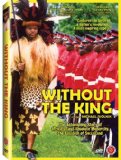| Reviews & Columns |
|
Reviews DVD TV on DVD Blu-ray 4K UHD International DVDs In Theaters Reviews by Studio Video Games Features Collector Series DVDs Easter Egg Database Interviews DVD Talk Radio Feature Articles Columns Anime Talk DVD Savant Horror DVDs The M.O.D. Squad Art House HD Talk Silent DVD
|
DVD Talk Forum |
|
|
| Resources |
|
DVD Price Search Customer Service #'s RCE Info Links |
|
Columns
|
|
|
Without the King
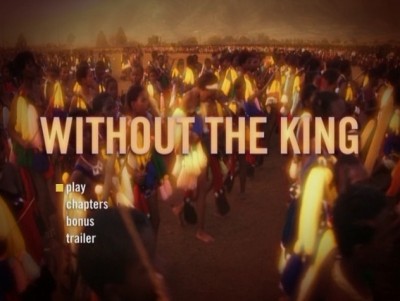
The feature-length documentary Without the King (2007), by filmmaker Michael Skolnik, provides a glimpse into the misery and machinations of a country rarely mentioned by the major media outlets in America: the Kingdom of Swaziland. Ruled by the last absolute monarch in Africa, this tiny landlocked kingdom surrounded by South Africa and Mozambique is home to 1.1 million of the earth's poorest people. While the royal family owns more than 70% of the nation's wealth, and has overseas holdings valued at more than $10 billion, the majority of the Swazi people survive on less than a dollar a day, much in the form of humanitarian assistance from abroad. To further compound the misery, Swaziland suffers the lowest documented life expectancy in the world, just 31 years, and the world's highest known rate of HIV/AIDS, standing now at 42.6 percent of the population.
Despite all its ills, Swaziland has avoided the bloody fighting that has gripped much of sub-Saharan Africa, but as Skolnik documents, discontent is simmering. The 38-year-old King Mswati III wields power through the appointment of all the Government ministers including the Prime Minister, one-third of Parliament, and all the nation's judges. Even those parliamentarians not directly appointed by the King are typically beholding to him and his immense wealth.
Against this backdrop, Skolnik interviews a number of men and women outside the approved political structure which brooks no opposition parties. Many are unemployed, living in squalid conditions in rural villages without clean drinking water, much less opportunities to earn a livelihood. Skolnik documents the growing frustration and apparent emerging cohesion of the dispossessed. One young socialist interviewed by Skolnik succinctly puts the growing militancy this way: "Yesterday, I was prepared to die for the struggle, but today I don't want to die for the struggle. I want to kill for the struggle." Soon after this interview was filmed, this young man and sixteen others were arrested for allegedly bombing government offices and the homes of politicians. Curiously though, despite facing the death penalty, these alleged bombers were subsequently released on bail pending trial.
It's clear that Skolnik would like to be able to document some serious challenge to the King's authority, but a peaceable march by a few dozen civilians to the gates of the parliamentary compound, and footage of a couple dozen young men throwing stones at an armored vehicle are the best that Skolnik can muster. And despite his best efforts to heighten the drama by filming from in the midst of the demonstrators as they confront the police, the meager demonstration is anti-climatic.
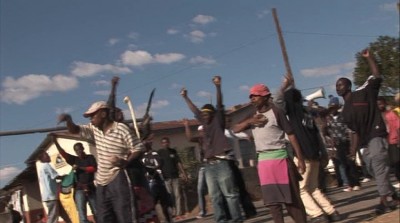
Thankfully, Skolnik's access is not just limited to this handful of demonstrators. He also obtains access to the King, the King's first of thirteen wives, and his oldest of 22 children. Though 13 wives and 22 children may sound extravagant, it's modest compared to his late father's 110 wives and 250 children, but the King is still a young man and has time to put a dent in his father's record, assuming he can hold on to power long enough to do so. During the one sit-down interview apparently granted to Skolnik by King Mswati III, the ruler is genial and tries with a wink and a nod to portray himself as an enlightened monarch dedicated to the advancement of his people. Skolnik takes no issue with this directly, and gives the King the floor to have his say, leaving it to the film's editing to give the lie to this portrayal.

The interview with Queen LaMbikiza also appears to be limited to a single sit-down interview during which she downplays her reputation as the "rebel queen" and refutes rumors that she tried to kill her husband with poison. Queen LaMbikiza claims to more or less comply with the wishes of her handlers, and not to be bothered by her husband's still-increasing collection of wives.
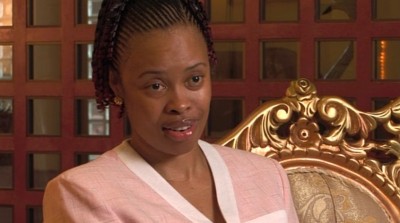
By far, the greatest level of access is provided by King Mswati III's eldest daughter, Princess Sikhanyiso, aka Pashu, age 18. Pashu appears to have grown up immersed in MTV. She uses the initial interview with Skolnik to display her dubious talent for rapping, and to show off the palace and her personal beauty salon, MTV Cribs style. Later, when she heads off to southern California for college, she invites a film crew to tag along, all MTV Real World style, as she settles in her new home and visits the Hollywood Walk of Fame and Venice Beach.

With limited direct access to the King, Skolnik uses footage of the ruler at various ceremonies, especially the annual celebration of virginity at which he chooses a young bride among the 70,000 girls in attendance. Skolnik also includes a lot more of Princess Pashu to fill the 83-minute runtime. Between childlike musings that, for example, it'd be great if Swaziland was more like the corner of Hollywood and Vine except that then there'd be no reason to travel, Pashu earnestly plays, for most of the film, the devoted daughter that believes that the rest of the world misunderstands her father's good intentions. Pashu's first doubts about her father appear during a trip home, when she see's the misery of an AIDS orphanage for the first time. It's here that she vows that things will change for the better in her lifetime. So ends the film.
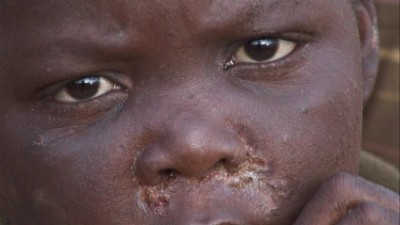
The DVD
The Video:
The 1.85:1 image is letterboxed on this release. Archival footage is of varying qualities, while most of the new footage generally looks acceptable despite interlacing, minor aliasing, and some fluctuation in color levels.
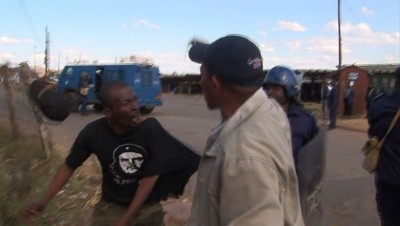
The Audio:
The 2.0 Dolby Digital audio track is serviceable with no noticeable dropouts or distortion, though only post-production sound makes much use of the 2.0 format.
Occasional English subtitles over SiSawti and some accented English dialogue is forced. There are no subtitle options provided.
The Extras:
Extras consist of eight deleted scenes, and the theatrical trailer.
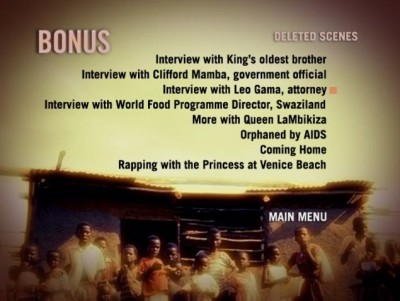
Final Thoughts:
Without the King is a modest success in so much as it sheds light on a land of miserable deprivation rarely seen here in the West. Unfortunately, the material available to filmmaker Michael Skolnik appears too limited for his purposes. If change comes to Swaziland, it won't be an MTV-revolution led by Princess Pasha, and it'll take a lot more than the couple dozen stone-throwing young men mustered for Skolnik's camera. Pasha and the handful of discontents may be representative of the disconnect of the royal family and the discontent of the People, respectively, but there's really no way to know where things are going or how representative this few figures are. At present, Without the King plays like a work in progress patched together with filler while awaiting weightier material.
Rent it.
|
| Popular Reviews |
| Sponsored Links |
|
|
| Sponsored Links |
|
|
| Release List | Reviews | Shop | Newsletter | Forum | DVD Giveaways | Blu-Ray | Advertise |
|
Copyright 2024 DVDTalk.com All Rights Reserved. Legal Info, Privacy Policy, Terms of Use,
Manage Preferences,
Your Privacy Choices | |||||||









